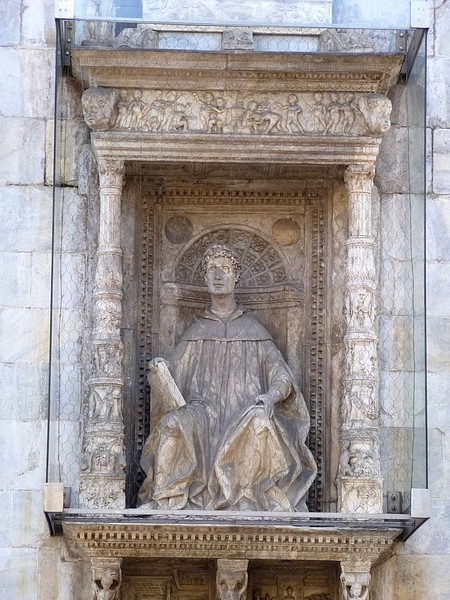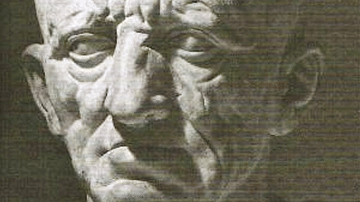
Pliny the Younger (61-112 CE) was the nephew of Pliny the Elder (23-79 CE), the author of the 37-volume Natural History. He had a remarkable political career and gained a reputation as an excellent lawyer and orator, but he is most famous for his writings.
Although only one of his orations, the Panegyricus Traiani survives, his letters, the Epistulae, cover a wide range of subjects and provide insight into the everyday life and concerns of the contemporary elite. Among the most notable are his account of the eruption of Mount Vesuvius and his correspondence with Emperor Trajan (r. 98-117 CE) regarding Christians.
Early Life
Pliny the Younger or Publius Caelius Secundus was born around 61 CE to a family of wealthy, upper-class landowners in the northern Italian town of Novum Comum. After the death of his father, a local magistrate, he was adopted by his maternal uncle Gaius Plinius Caelius Secundus, Pliny the Elder, on the condition that the young man would adopt his uncle's name. Until he was 14, he had a guardian to watch over his financial and legal issues; a common Roman custom. Before he left home to study rhetoric with the Spanish-born educator Quintilian in Rome, he was tutored by the former governor and consul Verginius Rufus.
He was 17 years old when Mount Vesuvius erupted and Pliny the Elder commanded a fleet of ships attempting to rescue victims from Pompeii. The Elder Pliny would die from the effects of volcanic gases but Pliny the Younger remained at the Bay of Naples city of Misenum and described the events later in his Epistulae.
In a letter written to Tacitus:
He [Pliny the Elder] gave orders for the warships to be launched and went on board himself with the intention of bringing help to many more people besides Rectina, for this lovely stretch of coast was thickly populated. He hurried to the place which everyone else was hastily leaving, steering his course straight for the danger zone. He was entirely fearless, describing each new movement and phase of the portent to be noted down exactly as he observed them. Ashes were already falling, hotter and thicker as the ships drew near, followed by bits of pumice and blackened stones, charred and cracked by the flames: then suddenly they were in shallow water, and the shore was blocked by the debris from the mountain. For a moment my uncle wondered whether to turn back, but when the helmsman advised this he refused, telling him that Fortune stood by the courageous….
(Letters 6.16)
Political Career
After serving one year on the staff of a Syrian legion, he began the long, imperial road through the cursus honorum. The road took him through the reigns of both good and bad emperors: Domitian (r. 81-96 CE), Nerva (r. 96-98 CE) and Trajan. It was under Trajan that he achieved his final position as governor of Bithynia-Pontus, a Roman province on the Black Sea coast of present-day Turkey. Although he practiced law in the civil courts specializing in cases relating to inheritance, he gained a notable reputation as an excellent orator and would later conduct several prosecutions in the Roman Senate against provincial governors in Spain and Africa (Marcus Priscus) charged with extortion.
Demonstrating keen financial insight, he began his career as a quaestor in 88 CE, a tribune of the plebs in 91 CE, a praetor in 93 CE, praefectus aerari militaris or prefect of the military treasury from 94 to 96 CE, praefectus aerari Saturni or prefect of the treasury of Saturn from 98 to 100 CE, a suffect consul in 100 CE, the curator alvei Tiberius or overseer of the banks of the Tiber from 104 to 106 CE, a three-time member of the judicial council of Trajan from 104 to 107 CE, and lastly, legatus Augusti or governor from 109/110 CE to his death in 112 CE.

It was for his appointment as a Roman consul on 1 September 100 CE that Pliny wrote his oration Panegyricus Traiani. Delivered before the Senate, it paid homage to Emperor Trajan. While Domitian was described as arrogant, cowardly, cruel, and greedy, Trajan was seen as a moderate ruler who was considerate of the Senate, treating its members, even those in opposition, as equals. He was portrayed as a fair, skilled administrator, disciplined, tolerant, and patient. The speech praised not only the emperor but also his sister Marciana and his wife Plotina who was depicted as a model of chastity.
Pliny writes on Trajan:
… I [Pliny the Younger] should never, even if I had power equal to that of the gods, have conceived of a prince [Trajan] like ours…In short, there has been no prince in the past whose virtues have not been tarnished by vices. But our prince has obtained unprecedented praise and glory. His seriousness is not lessened by his cheerfulness, his gravity by his simplicity, or his dignity by his humanity. He is steady, tall, and stately in mien and bearing, and though his is in the prime of life his hair is becoming gray - a sign of approaching age. These are the marks that proclaim the prince.
(Panegyric, Sept. 1, 100 CE)
Epistulae
Although Pliny the Younger led what many would consider a remarkable political career, he is best remembered for his extensive letter writing - a common habit among his contemporaries and members of the elite. Pliny even wrote to his fellow essayist and friend the historian Tacitus. Pliny supplied his recollection of the eruption of Vesuvius for inclusion in Tacitus' Histories. From 99 to 109 CE, during his role in various government posts, he would not only compose two volumes of verses but also write nine books of 247 literary letters, his Epistulae. The letters, often containing advice, were to family and friends and frequently contained a strong, moral message. They were carefully composed and written in a detailed, formal style. Many believe the letters were later carefully edited by Pliny before publication. The letters contained comments on social and domestic affairs as well as contemporary judicial and political events, especially as they related to the much-hated Emperor Domitian.
Although he realized the tenuous nature of speaking out against a Roman emperor, Pliny still maintained a close relationship to many of Domitian's “victims.” He even censured slave owners for their cruelties. Historians would maintain that the letters revealed a true picture, a self-portrait, of the author as well as his times, revealing a close look into a senator's life. They were written to project Pliny as being both cultured and humane, reflecting the feelings of many of the Roman elite.

A tenth volume of 100 letters contains correspondence between Pliny and Emperor Trajan while the former served as governor. Most of the letters deal with common, everyday affairs: legal disputes, protocol, the condition of provincial finances, building schemes, the Nicomedian aqueduct, the theatre at Nicaea, and even how the emperor's birthday was celebrated in the province. The letters were not free of complaints and annoyances. In one letter Pliny asked advice about slaves who wanted to join the Roman army, which was open only to the free-born. Many of the letters, however, were concerned with the growing Christian population. Pliny believed the Christian "fraternities" were perverse as well as "depraved and immoderate" superstitions. Pliny was unsure and sought the emperor's advice on how to deal with what he saw as a major problem.
Writing to Emperor Trajan:
It is my practice, my lord [Trajan], to refer to you all matters concerning which I am in doubt...I have never participated in trials of Christians. I therefore do not know what offenses it is the practice to punish or investigate, and to what extent. And I have been not a little hesitant as to whether there should be any distinction on account of age or no difference between the very young and the more mature, whether pardon is to be granted for repentance, or, if a man has once been a Christian….I have interrogated these as to whether they were Christians; those who confessed a second and a third time; threatening them with punishment; those who persisted I ordered executed.
(Letters 10.96-97)
At the time Pliny was conducting both trials and executions of suspected Christians. Pliny wrote that he always gave supposed Christians the opportunity to recant; if not, they would be executed. In one instance he had two suspected Christian women slaves questioned and then tortured and wanted Trajan's opinion on the matter. Trajan replied that Christians should not be sought out, but if found they should be tried, and if found guilty, they should be executed. However, if they were Roman citizens, they must be sent to Rome for trial. During the trial phase or exam, suspected Christians would be asked if they would make a public offering to the gods and deny the name of Christ. If the suspect passed, he or she would be released, otherwise, the individual faced execution.
Conclusion
Pliny led a remarkable career and, luckily, his letters reveal not only his personal life but also provide a glimpse into the life of the elite. He married three times with no children. His last wife was Calpurnia who was from his hometown of Novum Comum. He married her, 25 years his junior, shortly after the death of his second wife in 97 CE. Many of the letters to her reveal a man of deep passion. She returned to Italy after the death of her grandfather where she remained. Pliny never returned home and died in 112 CE while still governor of Bithynia-Pontus.







